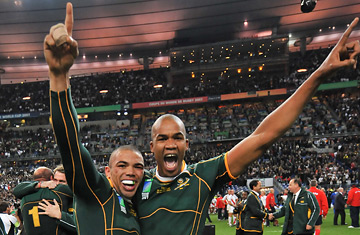
South African international rugby players Bryan Habana and JP Pietersen
It's been just a few weeks since South Africa's Springbok team tore through the Rugby World Cup tournament unbeaten and flew home as champions to their enthralled countrymen. But in politics — including South Africa's entangled racial politics — a few weeks is a very long time.
In a scramble to stop their star players and coach from signing lucrative contracts with talent-hungry European teams, South African officials on Wednesday scrapped a long-held commitment to racial quotas for their national sports teams. That plan was one of the cornerstones of President Thabo Mbeki's push to integrate sports in a sports-crazed nation, and help close the huge racial schisms left by decades of apartheid. "Quotas are out," the sports minister Makhenkesi Stofile said in a parliamentary hearing on Wednesday attempting to explain the reversal. "We are not going to decide who must be on the team," he said. "All we are saying is: expose everybody, give them an opportunity."
The government's backtracking came after months of fraught debate over its rugby team — South Africa's surest hope in any sport of capturing a world title. While the Springboks played a spectacular tournament, they did so with few black players, despite coming from a country with an 80% black majority. All but six of the 30-man rugby squad were white, and only two Springboks of color played in the World Cup final.
That fact was so visually striking in the global World Cup telecasts that it sparked intense discussion back home among politicians, who argued that whites had resisted integration at club-level rugby, and thus stifled blacks' advancement to international competition. Even before the team's opening game in Paris in August, the Springboks' manager Zola Yeye, the first black South African in the job in the team's 101-year history, told TIME that the team — good as it was — was an "indictment" of South African rugby's failure to integrate. He said he believed racial quotas might ultimately be the only way to create a team that reflected the country's ethnic makeup.
But the government's commitment to racial quotas has unraveled rapidly since the World Cup final on October 20. Back home, the Springboks' winning coach, Jake White, bluntly told reporters that South Africa's racial politics were driving him out of the country. White is largely credited for creating a near-flawless World Cup team, and is in talks to become England's national rugby coach. In addition to White, two star Springbok players have already signed large contracts with French teams.
Adoring Springbok fans have called talk shows to express their fears that their stars would all bolt from the country and leave South Africa with little hope for future wins. A few weeks ago, government officials dropped a decision to bar Springbok players from playing future international tournaments if they played for local teams overseas. As the political arguments have grown more heated, one South African rugby blogger wrote wistfully this week: "We knew it was too good to last! The feel-good atmosphere in SA Rugby after the Boks' World Cup triumph did not even make it to the two-week mark."
For coach White and some of his players, the government's decision to drop racial quotas has came too late. The sports minister Stofile said the new government plan would be to develop star black rugby players. That might require huge financial resources, however, including rugby training at poor, black-dominated high schools. Such an initiative would surely require years of investment and commitment — and in politics, that's an eternity.
